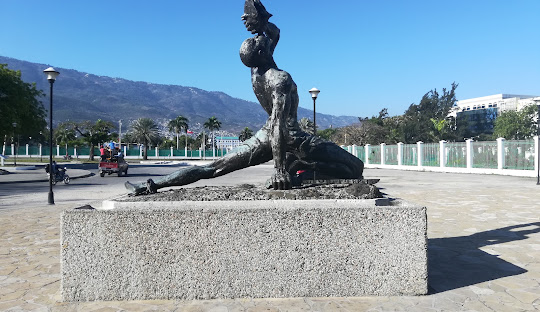Port-au-Prince, Haiti
🇭🇹 Port-au-Prince, Haiti: A City of Resilience, Culture & History
Port-au-Prince, the bustling capital of Haiti, is a city defined by its vibrant culture, complex history, and unyielding spirit. Known for its colorful streets, artistic heritage, and lively music scene, the city is a gateway to understanding Haiti's rich history and its journey toward resilience. While the city has faced challenges, it remains a dynamic hub for art, history, and the heart of Haitian culture.
🏛️ Top Things to See & Do
🏰 Musée du Panthéon National Haïtien (MUPANAH)
This museum is one of the most significant cultural sites in the country. Located in the heart of the city, it showcases Haiti's history and its revolutionary fight for independence. Highlights include portraits of national heroes and artifacts from the Haitian Revolution.
🎨 Iron Market (Marché en Fer)
A must-visit for any traveler, this iconic market is a place where you'll find a mix of handcrafted art, local goods, and vibrant street life. The market is also famous for its metal artwork, reflecting the ingenuity of Haitian artisans. It's a perfect spot to buy unique souvenirs like wood carvings, handmade jewelry, and colorful textiles.
🏞️ National Palace (Palais National)
Although it was damaged during the 2010 earthquake, the National Palace remains a key symbol of Haitian history. The nearby Place d'Indépendance is an important historical square that commemorates Haiti’s independence from France in 1804.
🌆 Mountainous Views from Fort Jacques
For a scenic escape, head to Fort Jacques, located just outside the city. From the fort, you’ll have a panoramic view of Port-au-Prince and the surrounding landscape. It’s also an excellent spot for a hike through the lush hills.
🎭 Carrefour de l'Art
This open-air gallery is a vibrant celebration of Haiti’s artistic heritage. It's an ideal place to witness the expressive artistry that is so deeply tied to the Haitian culture. You'll find paintings, sculptures, and textiles representing Haiti’s historical and cultural narratives.
🎶 Live Music and Nightlife
Port-au-Prince is known for its lively Kompa and Rara music scenes, and visitors can experience live music in various clubs and bars. La Kay and Le Bistro de la Place offer great spots to enjoy local music and dance.
🍽️ What to Eat & Drink
Haitian cuisine is a blend of African, French, and indigenous Caribbean influences. Some local dishes you can’t miss include:
-
Griot – Fried pork, served with fried plantains (known locally as "patté")
-
Marinad – Haitian fritters made from seasoned dough, often served with spicy sauces
-
Joumou – A hearty pumpkin soup traditionally eaten on New Year's Day to commemorate Haiti’s independence
-
Akra – A delicious fritter made from malanga (a root vegetable), served with hot pepper sauce
-
Haitian Rum – Enjoy a glass of Clément or Barbancourt rum, some of the finest in the Caribbean
Top dining spots:
-
Restaurant Lakay – Known for authentic Haitian dishes and a relaxed ambiance
-
Bistro Biranne – A popular spot offering international and local cuisine
-
Le Petit Restaurant – A quiet spot with delicious Caribbean seafood
🏨 Where to Stay
Port-au-Prince offers a range of accommodations, from luxury hotels to budget-friendly guesthouses.
-
Hotel Karibe – A luxurious hotel with pools and a full-service restaurant, offering a relaxing atmosphere in the heart of the city
-
The Royal Oasis Hotel – A well-rated hotel offering modern amenities, a pool, and easy access to the city’s main attractions
-
Hotel Le Plaza – A comfortable and affordable option in the city center
📅 Best Time to Visit
-
December–April: Dry season with pleasant temperatures, ideal for exploring the city and surrounding areas
-
May–November: Rainy season; although it can be humid, the lush landscapes are at their peak
🚗 How to Get Around
-
Taxis: Taxis are available throughout the city, but it’s advisable to negotiate fares before starting a journey.
-
Moto-taxis (Motorcycle Taxis): A popular (and quick) way to get around, though you should always ensure safety measures.
-
Private Cars: For a more comfortable and secure option, private drivers are available for hire.
🎉 Cultural & Entertainment Highlights
-
Carnival: Haiti’s Carnival is a huge annual celebration, known for its vibrant parades, music, and colorful costumes. It's the best way to experience the nation’s festive spirit.
-
Haitian Vodou: Visit a Vodou ceremony or exhibition to learn about Haiti’s unique belief system that blends African, Catholic, and indigenous traditions.
🛍️ Shopping & Souvenirs
-
Haitian Art: Colorful paintings, metal sculptures, and wooden carvings are widely available in the markets and art galleries.
-
Handmade Jewelry: Unique designs made from local materials like seeds, beads, and metals.
-
Haitian Vodou Flags: A traditional embroidered flag, often depicting scenes from Haitian Vodou.


